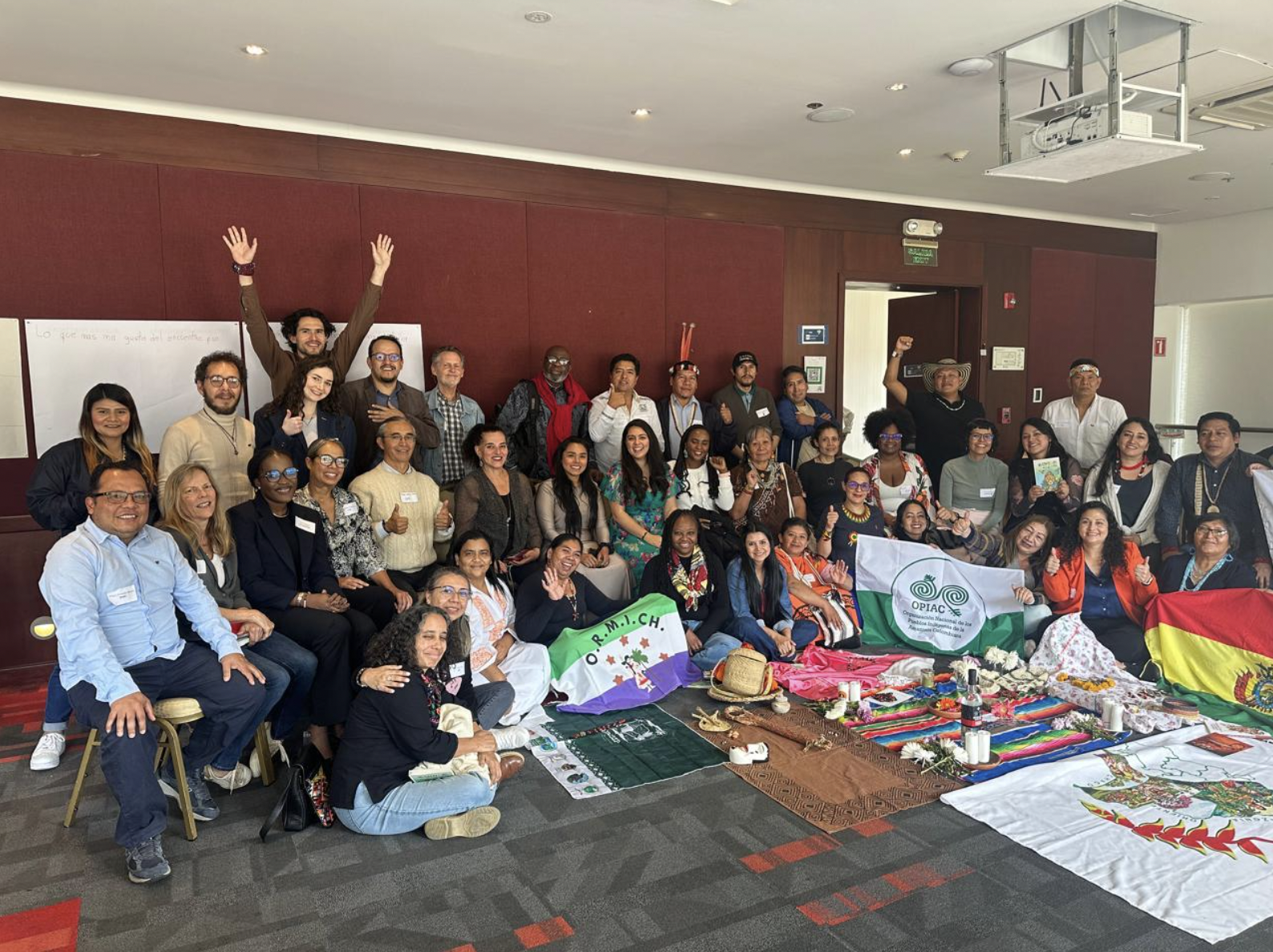
From August 13 to 15, 2025, 42 Indigenous and Afro-descendant participants from 22 organizations across Bolivia, Peru, Ecuador, and Colombia came together in Bogotá, Colombia, for a powerful regional gathering hosted by the CLARIFI Initiative, along with Campaign for Nature and the Global Alliance of Territorial Communities. The gathering was designed around collective learning and cultural relevance, guided by three strategic objectives: to share lessons learned and achievements from CLARIFI-supported projects; to identify and document good operational and strategic practices; and to co-create actionable recommendations for future work and long-term sustainability. The event’s participatory methodology centered on relational dialogue, narrative storytelling, and systemic thinking by honoring the voices of all participants and connecting organizational insights to community realities
We extend our deepest thanks to all the organizations who made this gathering so rich in knowledge, spirit, and collaboration. From Colombia, we were honored to welcome ASOM, CNTI, Fuerza Mujeres Wayuu, ONIC, OPIAC, and PCN, who each contributed invaluable perspectives from Indigenous and Afro-descendant movements. From Ecuador, COICA, CONFENIAE, Fundación ALDEA, Fundación AZUCAR, Fundación Kambak, and NAWE shared experiences from across the Amazon and Afro-Ecuadorian territories. From Peru, we were joined by AIDESEP, CAOI, CEDET, and ONAMIAP, representing diverse Andean and Amazonian contexts. And from Bolivia, CEJIS, CNAMIB, Fundación Tierra, IBIF, and ORMICH brought critical insights on forest governance, Indigenous women’s leadership, and land rights.
The three days in Bogotá were a testament to the strength, diversity, and shared vision of the CLARIFI community! Below, you’ll find a full recap of the event, including key findings, practices, and recommendations to carry this work forward together.
The first day of the gathering focused on grounding participants through the sharing of stories, lessons, and transformative experiences from their CLARIFI-supported projects. The day’s activities aimed to locate each organization’s work on a regional map, exchange key learnings and organizational shifts, and identify shared themes across countries and communities.
The day began with a collaborative mapping activity, where each organization marked the location of their projects on a large map of Colombia, Ecuador, Peru, and Bolivia. This created a powerful visual representation of the geographic reach and diversity of the CLARIFI initiative.
Next came a poster fair, where each organization showcased their project’s reflections by answering three guiding questions in advance. These included practical advice for peers starting similar work, insights into changes within their organizations, and a brief narrative capturing a moment when the project’s impact was clearly felt. Many of these stories were also recorded as audio and shared via QR codes.
Participants explored the posters, leaving stickers and notes where they found resonance or inspiration, and later came together in plenary to discuss synergies and shared challenges. This conversation revealed deep reflections on the social and political pressures organizations face, the importance of solidarity, and the urgent need for stronger regional alliances.
Above all, the day highlighted the power of storytelling and active listening as essential tools for weaving stronger organizational networks and affirming the collective identity of the CLARIFI community.
The second day of the gathering turned attention to the complex realities shaping project implementation across the region. Through a collaborative mapping exercise, participants identified the key risks and underlying assumptions that influence the success and the sustainability of their work. The objective was to surface shared challenges while recognizing the unique contexts each organization faces.
Participants were divided into five working groups, which were comprised of one for each country (Colombia, Ecuador, Peru, Bolivia) and one focused on regional Amazonian reflections. Each group created a risk and assumptions map, considering factors such as political instability, governance, corruption, economic pressures, and threats of violence.
The exercise revealed significant common ground across national contexts, with recurring themes such as weakening institutional support, extractive pressures, and limited state presence in rural or forested areas. By naming these risks and unpacking their implications, participants gained valuable insights for proactive planning and collective risk management. These maps now serve as a foundation for strengthening adaptive strategies, shared responsibility, and long-term resilience across the CLARIFI network.
The third and final day of the CLARIFI gathering focused on the strategic dimension of community-led action including what works, why it works, and how it can be scaled or adapted. Participants came together to reflect on long-term impact and transformational change, identifying lessons learned and best practices that have strengthened their organizational strategies and advocacy efforts.
Through thematic conversation circles, participants organized themselves around six key strategic areas: cultural identity and ancestral knowledge; territorial governance and legal-political advocacy; women’s leadership and participation; environmental conservation and climate action; organizational strengthening and alliance-building; and protection of human and environmental rights defenders. In each group, individuals shared real-world examples of what had worked in their projects and why.
The insights shared reflected a deep commitment to structural transformation including reinforcing women’s leadership and intergenerational knowledge, as well as strengthening alliances that defend territory and rights. Many practices showed not only internal value for organizations but also external influence on policy, public discourse, and territorial defense.
By systematizing these practices, the CLARIFI community is building a growing repository of strategic knowledge which offers pathways to strengthen community processes, inform allies’ approaches, and scale impact across the region.
The learning exchange concluded with a powerful set of strategic recommendations Participants called for immediate and sustained action from Campaign for Nature, the Global Alliance of Territorial Communities and CLARIFI, including the creation of strategic plans, legal support networks, women-focused funding, and intercultural education. Emphasizing the urgency of structural change, these recommendations aim to ensure long-term impact, territorial autonomy, and resilience.